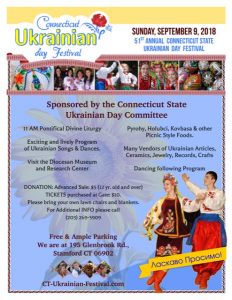Christ is in our midst!
WELCOME NEW PARISHIONERS! New parishioners are always welcomed in our parish. If someone wants to register with our parish please contact Father Iura Godenciuc at (203) 865-0388 or our financial secretary Natalia Chermak.
PARISH COFFEE HOUR: Dear parishioners and guests, after each Divine Liturgy, coffee and hard rolls are available in the church hall.
VIGIL LIGHT: This week the vigil light is offered to God’s greater glory by Catherine Kolesnik for Special Intention.
PASSING: Together as a parish, we mourn the passing of Senator John McCain. He was truly an American hero who dedicated his life to the service of our country. Please pray for the repose of his soul. May his memory be eternal.
PASTOR’S ABSENCE: During my vacation, if you need a priest you may call: Fr. Stepan Yanovsky (203) 468-6457, or Fr. Ivan Mazuryk (203) 367-5054. From September 8, Fr. Volodymyr Piso can be reached at the rectory office (203) 865-0388. Blessings, Fr. Iura.
SEPTEMBER 1st: The Byzantine Church inaugurated the First of September as the beginning of the liturgical year in A.D. 312. The Birth of the Mother of God, celebrated on September 8, is the first major feast day of our Church’s liturgical year. The great significance of the liturgical year’s first feast becomes apparent when we meditate on the fact that Mary’s birth is the beginning of salvation. She is going to carry God in her womb. It is her cooperation with God that enables Him to become man and that makes us more like God and brings us closer to Him. In a hymn, on the feast day, we sing: “Your Nativity, O Mother of God has made joy known to all the world, for from you dawned the Sun of Righteousness, Christ our God. He abolished the curse and by making death of no effect, He bestowed on us eternal life.” Let us pray:
Christ our Lord, You who provide the rains and fruitful seasons, and hear the prayers of those who humbly seek You, accept also our requests about our needs and concerns and deliver us from worry, danger and sin. Your mercies are as abundant as Your works.
Bless all our activities, direct our steps by Your Holy Spirit, and forgive our shortcomings. Lord, bless the year with Your goodness and make it a year of grace for all of us. Amen.
Resolve to make each day the beginning of a new year, a new morning, a new adventure. Christ wipes the slate clean so we can be filled up again with His spirit and give it out all day long.
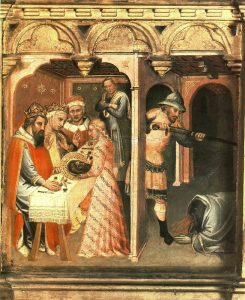 Today is the feast of the beheading of St. John the Forerunner and Baptist.
Today is the feast of the beheading of St. John the Forerunner and Baptist.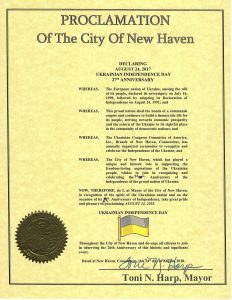 At a brief ceremony today following the second Divine Liturgy, members of our Ukrainian community gathered in the parish yard in front of the Holy Theotokos and our flags to pray and reflect upon the anniversary of Ukrainian Independence.
At a brief ceremony today following the second Divine Liturgy, members of our Ukrainian community gathered in the parish yard in front of the Holy Theotokos and our flags to pray and reflect upon the anniversary of Ukrainian Independence.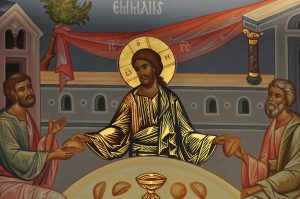 Read: 2 Corinthians 1:21-2:4; Matthew 22:1-14
Read: 2 Corinthians 1:21-2:4; Matthew 22:1-14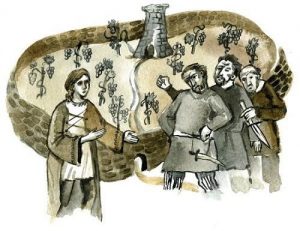 Read: 1 Corinthians 16:13-24; Matthew 21:33-42
Read: 1 Corinthians 16:13-24; Matthew 21:33-42